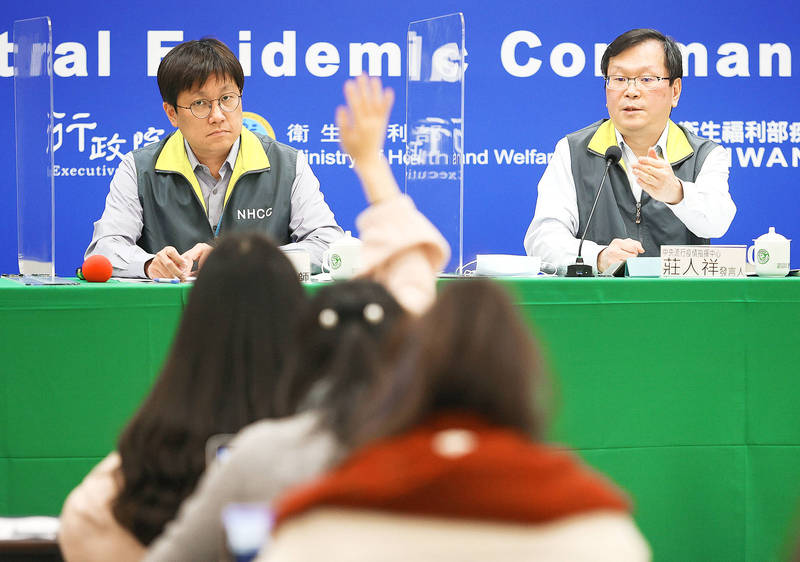《TAIPEI TIMES》 Taipei restricts quarantine hotel bookings

A reporter raises her hand after Central Epidemic Command Center spokesman Chuang Jen-hsiang, right, and Centers for Disease Control physician Lin Yung-ching discuss two imported COVID-19 cases at a news conference in Taipei yesterday. Photo: CNA
By Lee I-chia, Tsai Ya-hua, and Jonathan Chin / Staff reporters, with staff writer
Ahead of an expected wave of people returning from abroad for the Lunar New Year holiday, the Taipei City Government yesterday said that from Monday next week to Jan. 28, only Taipei residents would be allowed to stay at the city’s quarantine hotels.
The measure, which took effect yesterday, was adopted in response to widely reported room shortages, the Taipei Department of Information said in a statement.
Residents of jurisdictions other than Taipei and foreigners who have made their reservations on or before Monday are not subject to those limits, it added.
Taipei has 95 quarantine hotels with a combined capacity of 6,475 rooms, but it expects about 4,000 people to check in two weeks from now, implying an occupancy rate of 60 percent, it said.
With the Lunar New Year holiday beginning on Feb. 11, travelers need to check in by Jan. 28 to visit their loved ones after the mandatory 14-day quarantine period, the department said.
Travelers must present a photocopy of their national ID card at the concierge as proof of residency when they check in, it added.
The Kaohsiung City Government followed suit later yesterday, announcing that quarantine hotels would be reserved for the city’s residents.
In related news, the Central Epidemic Command Center (CECC) yesterday announced two imported cases of COVID-19, both Taiwanese returning from the US, and reported the first case of serious flu complications this flu season.
Centers for Disease Control (CDC) Deputy Director-General Chuang Jen-hsiang (莊人祥), who is the CECC’s spokesperson, said that one of the imported COVID-19 cases confirmed yesterday is a Taiwanese woman in her 70s who lives in the US and last departed Taiwan in November last year.
She provided a negative polymerase chain reaction (PCR) test result taken before returning to Taiwan with a family member on Sunday, Chuang said, adding that she was tested for COVID-19 at the airport after she reported her symptoms, and the result came back positive yesterday.
The other case is a Taiwanese woman in her 20s who lives in the US and last departed Taiwan in September, Chuang said.
She had experienced a runny nose and nasal congestion early last month, but tested negative for COVID-19 on Dec. 15, Dec. 26 and Tuesday last week, Chuang said.
The woman also provided a negative PCR test report before boarding, but began suffering loss of smell on Saturday, and returned to Taiwan with a family member on Sunday, he said.
She tested positive in a test taken at the airport upon arrival, Chuang said.
Meanwhile, CDC Epidemic Intelligence Center Director Guo Hung-wei (郭宏偉) said that the weekly number of flu-like illness reported this flu season have remained relatively low, he said, adding that only one case of serious flu complications was confirmed last week, while 583 cases of serious flu complications, including 87 deaths, were reported in the same period last year.
The only serious case reported so far is a 77-year-old woman, who lives in northern Taiwan and did not receive a flu shot this season. She was confirmed to be infected with the influenza A (H3N2) strain.
Chuang said that among the two subtypes of influenza A virus, the H3N2 strain more often affects elderly people, who are also at higher risk of serious complications.
Guo said that a cluster of H3N2 infections was also reported at a childcare center in Kaohsiung last week, and five people at center had flu-like symptoms.
There are still about 153,000 doses of government-funded flu vaccines available, so people who are eligible are encouraged to get vaccinated as early as possible, Chuang said.
Additional reporting by Ko Yo-hao
新聞來源:TAIPEI TIMES




















